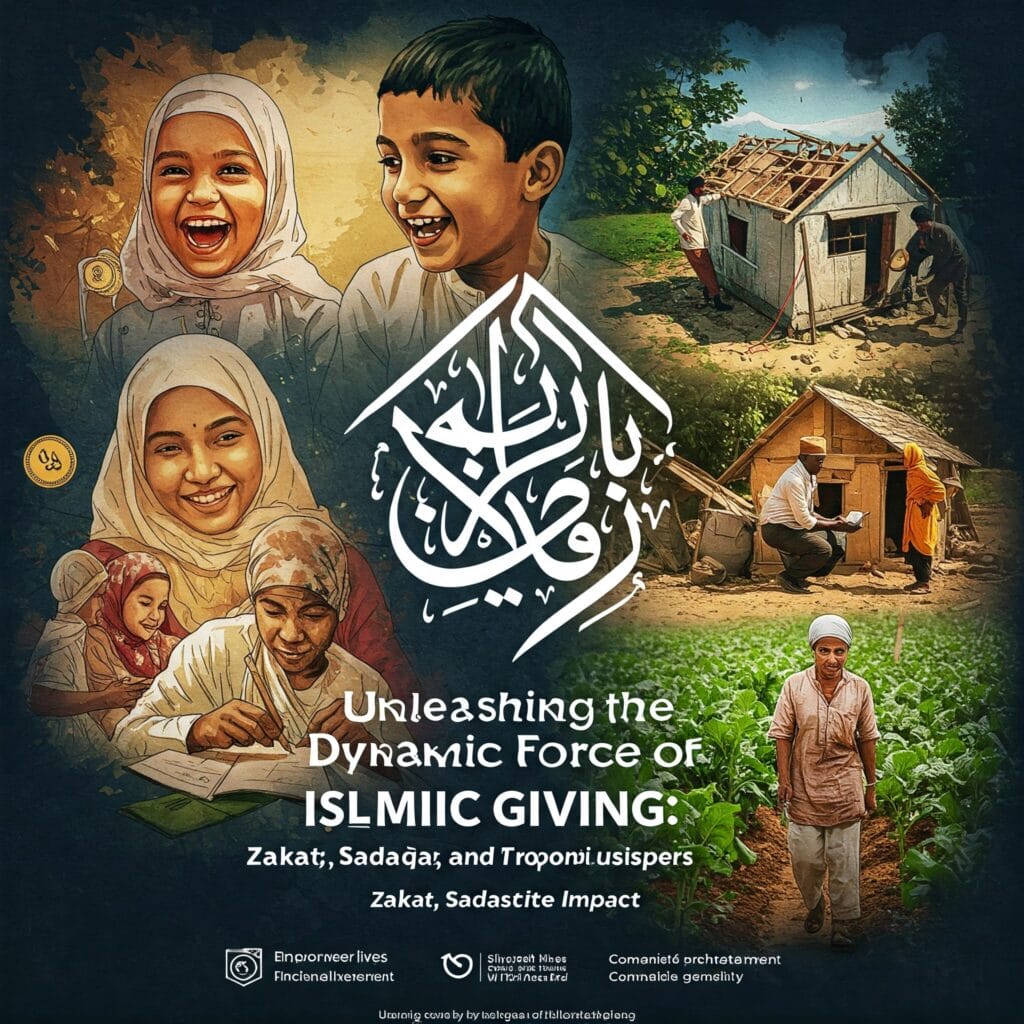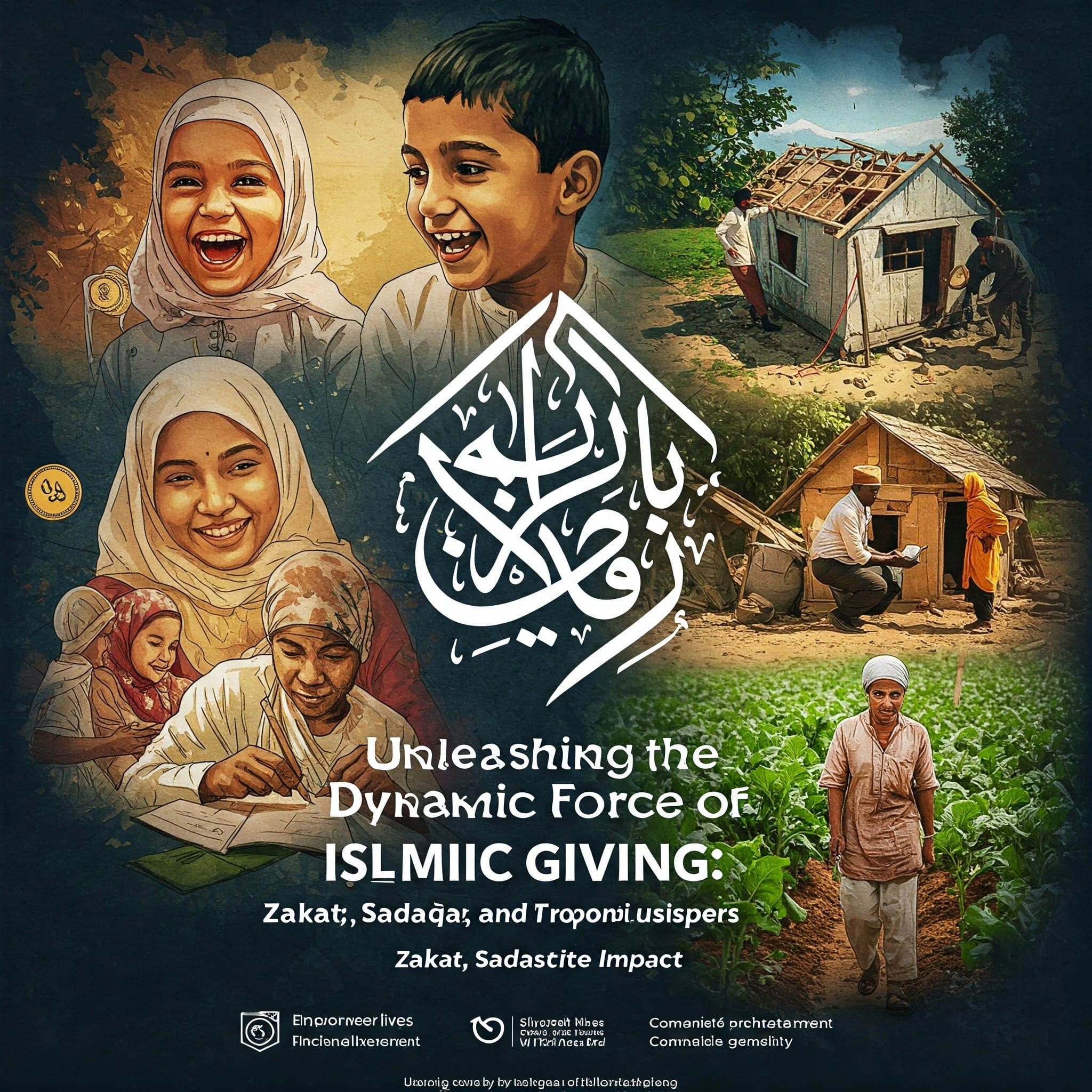Charity, a cornerstone of Islamic faith, embodies the principles of compassion, social justice, and spiritual purification. Rooted in the Qur’an and the Sunnah (teachings and practices of Prophet Muhammad, peace be upon him), charity in Islam is not merely an act of generosity but a sacred obligation and a means to attain closeness to Allah (God). Through structured forms like Zakat (obligatory almsgiving) and voluntary acts like Sadaqah (charitable giving), Muslims are encouraged to redistribute wealth, uplift the marginalized, and foster community solidarity. This in-depth article explores the theological foundations, types, practical applications, societal impact, and modern adaptations of charity in Islam, highlighting its transformative power in shaping individual lives and global Muslim communities.

Theological Foundations of Charity in Islam
Charity is one of the Five Pillars of Islam, specifically through Zakat, which underscores its centrality to faith. The Qur’an repeatedly emphasizes charity as a means of spiritual growth and social equity, with verses like Surah Al-Baqarah (2:261): “The example of those who spend their wealth in the way of Allah is like a seed which grows seven spikes; in each spike is a hundred grains. And Allah multiplies for whom He wills.” This metaphor illustrates the exponential spiritual and societal rewards of giving.
The Prophet Muhammad reinforced this, stating, “Charity does not decrease wealth” (Sahih Muslim, Book 45, Hadith 2588), emphasizing that giving purifies wealth and invites divine blessings. Charity in Islam serves multiple purposes:
- Spiritual Purification: It cleanses the giver of greed and attachment to material wealth, fostering Taqwa (God-consciousness).
- Social Justice: It redistributes resources to address inequality, aligning with Islam’s vision of a just society.
- Community Bonding: It strengthens ties between the wealthy and the poor, promoting empathy and mutual care.
- Divine Reward: Acts of charity are promised immense rewards in this life and the Hereafter, as per Surah Al-Hadid (57:7).
Charity is also an expression of Ihsan (excellence in faith), where giving is done selflessly, seeking only Allah’s pleasure. The Qur’an advises, “O you who have believed, do not invalidate your charities with reminders or injury” (Surah Al-Baqarah, 2:264), urging sincerity and humility.
Types of Charity in Islam
Islamic charity is broadly categorized into obligatory (Zakat) and voluntary (Sadaqah), with additional forms like Waqf (endowment) and humanitarian aid. Below is a detailed exploration of each.
1. Zakat (Obligatory Almsgiving)
- Definition: Zakat, meaning “purification” or “growth,” is a mandatory annual charity (2.5% of wealth) for Muslims whose savings exceed the Nisab threshold (equivalent to 85 grams of gold or 595 grams of silver, approximately $5,000–$6,000 USD in 2025).
- Eligibility: Payable on wealth held for one lunar year, including savings, gold, silver, business inventory, and certain agricultural produce or livestock.
- Recipients: The Qur’an (Surah At-Tawbah, 9:60) specifies eight categories: the poor, the needy, Zakat administrators, those whose hearts are to be reconciled, captives, debtors, those in the cause of Allah, and travelers.
- Calculation: For cash savings, 2.5% is donated annually. For example, $10,000 in savings requires $250 in Zakat. Online calculators, like those on Islamic Relief’s website, simplify this process.
- Significance: Zakat is a pillar of Islam, obligatory for financially capable Muslims, ensuring systemic wealth redistribution. The Prophet said, “The upper hand is better than the lower hand” (Sahih al-Bukhari, Book 24, Hadith 1427), encouraging self-reliance through giving.
- Practical Notes: Zakat is typically paid during Ramadan for increased reward but can be given anytime. Mosques and charities facilitate collection and distribution.
2. Sadaqah (Voluntary Charity)
- Definition: Sadaqah, meaning “righteousness,” encompasses voluntary acts of giving, including money, food, time, or even a smile. Unlike Zakat, it has no minimum requirement or fixed rate.
- Forms: Monetary donations, feeding the hungry, volunteering, teaching, or kind gestures. The Prophet said, “Your smile for your brother is Sadaqah” (Jami’ at-Tirmidhi, Book 27, Hadith 1956).
- Recipients: Anyone in need, regardless of faith or location, including family, neighbors, or global causes like disaster relief.
- Significance: Sadaqah is a flexible, accessible way to earn blessings and avert calamity. A Hadith states, “Sadaqah extinguishes sin as water extinguishes fire” (Jami’ at-Tirmidhi, Book 8, Hadith 614).
- Practical Notes: Muslims give Sadaqah spontaneously or regularly, often through charities or direct aid. Crowdfunding platforms like LaunchGood amplify its reach.
3. Sadaqah Jariyah (Continuous Charity)
- Definition: Sadaqah Jariyah refers to charitable acts with ongoing benefits, such as building a well, planting a tree, or funding education.
- Examples: Constructing mosques, schools, or hospitals; publishing Islamic books; or supporting orphans’ education.
- Significance: The Prophet said, “When a person dies, their deeds cease except for three: ongoing charity, knowledge that benefits, or a righteous child who prays for them” (Sahih Muslim, Book 13, Hadith 1631). Sadaqah Jariyah ensures perpetual rewards.
- Practical Notes: Organizations like Islamic Relief and Muslim Aid offer Sadaqah Jariyah projects, such as water wells ($1,000–$2,000) or orphanage sponsorships.
4. Waqf (Islamic Endowment)
- Definition: Waqf involves dedicating assets (e.g., land, buildings) for charitable purposes, with proceeds benefiting specific causes indefinitely.
- Examples: Endowing a hospital, mosque, or university. Historical Waqfs funded institutions like Al-Azhar University in Cairo.
- Significance: Waqf institutionalizes charity, ensuring long-term community support. It aligns with Islam’s emphasis on sustainable development.
- Practical Notes: Modern Waqfs include cash endowments managed by Islamic charities, though legal frameworks vary by country.
5. Humanitarian Aid and Disaster Relief
- Definition: Muslims contribute to global crises, such as famine, war, or natural disasters, as an extension of Zakat or Sadaqah.
- Examples: Donating to Syrian refugees, earthquake victims in Turkey, or flood relief in Pakistan.
- Significance: The Qur’an (Surah Al-Ma’idah, 5:32) equates saving one life to saving humanity, emphasizing humanitarian charity’s urgency.
- Practical Notes: Charities like UNHCR’s Islamic Philanthropy program and Human Appeal channel funds to urgent causes, ensuring compliance with Islamic principles.
Practical Applications of Charity
Charity in Islam is woven into daily life, with structured and spontaneous practices:
1. Annual Zakat Payment
- Muslims calculate Zakat annually, often during Ramadan, using savings, investments, or assets. Mosques, apps, or organizations like Zakat Foundation provide guidance and distribution channels.
- Example: A family with $50,000 in savings donates $1,250, which might fund food for the poor or debt relief for a struggling neighbor.
2. Regular Sadaqah
- Muslims give Sadaqah weekly, monthly, or spontaneously, such as donating to a beggar, sponsoring an orphan, or volunteering at a food bank.
- Example: Setting up a $10 monthly donation to a charity or sharing a meal with a neighbor.
3. Community Initiatives
- Mosques and Islamic centers organize charity drives, especially during Ramadan and Eid, collecting funds for local and global causes.
- Example: Toronto’s Islamic Foundation runs food drives, distributing groceries to low-income families.
4. Sadaqah Jariyah Projects
- Individuals or groups fund long-term projects, such as wells, schools, or renewable energy for impoverished areas.
- Example: A community raises $5,000 to build a well in Somalia, providing clean water for decades.
5. Humanitarian Response
- Muslims respond to global crises through donations or volunteering, often coordinated by NGOs like Islamic Relief, which operates in over 40 countries.
- Example: Donating $100 to earthquake relief in Morocco, ensuring immediate aid and rebuilding efforts.
Societal Impact of Islamic Charity
Islamic charity has profound effects on individuals and societies:
- Poverty Alleviation: Zakat and Sadaqah redistribute wealth, reducing inequality. In 2025, Islamic Relief distributed $250 million in aid, supporting 13 million people.
- Community Empowerment: Waqfs and Sadaqah Jariyah fund education, healthcare, and infrastructure, fostering self-reliance. For instance, Waqf-funded schools in Bangladesh educate thousands annually.
- Social Cohesion: Charity bridges class divides, as the wealthy support the poor, aligning with the Prophetic saying, “The believers are like one body” (Sahih al-Bukhari, Book 78, Hadith 6011).
- Global Solidarity: Muslim charities address crises worldwide, from Yemen’s famine to Rohingya refugee support, reflecting Islam’s universal ethos.
- Spiritual Growth: Giving purifies the giver’s heart, curbing materialism and fostering gratitude, as supported by psychological studies on altruism (Journal of Happiness Studies, 2025).
Cultural and Regional Practices
Charity practices vary across Muslim communities, reflecting cultural diversity:
- Middle East: In Saudi Arabia, Zakat is state-managed, with funds supporting welfare programs. Ramadan telethons raise millions for Sadaqah.
- South Asia: In Pakistan, Bait-ul-Mal distributes Zakat, while families give food (Fitrana) before Eid al-Fitr. Waqfs fund madrasas and hospitals.
- Africa: In Nigeria, community Zakat pools support orphans and widows, while Sadaqah includes sharing harvests with neighbors.
- Western Countries: In the US and UK, Muslims use online platforms like JustGiving or LaunchGood for Zakat and Sadaqah, adapting to digital giving trends.
Challenges in Practicing Charity
Despite its importance, Muslims face challenges in fulfilling charitable obligations:
- Financial Constraints: Low-income Muslims may struggle to pay Zakat or give Sadaqah, though non-monetary acts like volunteering are encouraged.
- Misallocation: In some regions, Zakat funds are mismanaged or fail to reach the neediest, prompting reliance on reputable NGOs.
- Awareness Gaps: New Muslims or youth may lack knowledge of Zakat calculations or eligible recipients, necessitating education via mosques or apps.
- Cultural Misconceptions: Public displays of charity or giving with expectation of praise contradict Islamic principles of sincerity, requiring community guidance.
- Regulatory Hurdles: In non-Muslim countries, tax laws or anti-terrorism regulations can complicate Zakat distribution, though organizations like the National Zakat Foundation navigate these.
Modern Adaptations and Innovations
Islamic charity has embraced modern tools to enhance impact:
- Digital Platforms: Apps like Zakatify and websites like Islamic Relief streamline Zakat calculations and donations, ensuring transparency.
- Crowdfunding: LaunchGood and GoFundMe host campaigns for Sadaqah Jariyah, such as mosque renovations or refugee aid, engaging younger Muslims.
- Microfinance: Islamic charities offer interest-free loans (Qard Hasan), aligning with Zakat’s goal of empowerment, e.g., helping entrepreneurs in Somalia.
- Sustainable Projects: Organizations prioritize eco-friendly Sadaqah Jariyah, like solar-powered wells or tree-planting, addressing climate change.
- Global Networks: Charities collaborate with UN agencies, as seen in UNHCR’s Refugee Zakat Fund, ensuring aid reaches conflict zones.
Etiquette of Giving Charity
Islamic teachings emphasize proper conduct in charity:
- Sincerity: Give for Allah’s pleasure, not recognition, per Surah Al-Baqarah (2:264).
- Discretion: Avoid publicizing donations to preserve the recipient’s dignity, as the Prophet praised those who give “in secret” (Sahih al-Bukhari, Book 24, Hadith 1423).
- Quality: Offer valuable items, not leftovers, as per Surah Al-Baqarah (2:267): “Spend of the good things which you have earned.”
- Empathy: Treat recipients with respect, ensuring charity uplifts rather than humiliates.
- Consistency: Regular giving, even small amounts, is better than sporadic large donations, per the Hadith: “The most beloved deed to Allah is the most regular” (Sahih al-Bukhari, Book 76, Hadith 6021).
Future Trends in Islamic Charity
As the global Muslim population grows (projected to reach 2.8 billion by 2050, per Pew Research), charity will evolve:
- Technology Integration: Blockchain and AI will enhance transparency in Zakat distribution, reducing fraud and ensuring funds reach recipients.
- Youth Engagement: Social media campaigns and gamified apps will educate young Muslims about charity, countering materialism.
- Sustainable Development: Charities will prioritize climate-resilient projects, like drought-resistant farming, aligning with Islamic stewardship (Khalifa).
- Interfaith Collaboration: Muslim charities will partner with non-Muslim NGOs, promoting shared humanitarian goals, as seen in joint flood relief efforts in Pakistan (2025).
- Policy Advocacy: Muslim organizations will lobby for Zakat-friendly tax policies in Western countries, easing cross-border giving.
Conclusion
Charity in Islam, through Zakat, Sadaqah, Waqf, and humanitarian aid, is a transformative force that purifies wealth, uplifts communities, and strengthens faith. Rooted in the Qur’an and Sunnah, it addresses poverty, fosters justice, and builds solidarity across cultures. Despite challenges like financial constraints or regulatory hurdles, Muslims worldwide embrace charity with sincerity, leveraging modern tools like apps and crowdfunding to amplify impact. From funding wells in Africa to supporting refugees in Syria, Islamic charity reflects a universal commitment to compassion and Ihsan. As Muslims navigate an interconnected world, the timeless practice of giving will continue to shape societies, offering spiritual rewards and tangible change, one act of generosity at a time.
Must read:
- Unleashing the Mighty Strength of Islamic Protective Duas: A Divine Fortress
- Leading 5 Islamic Studies Institutions in France for Global Students
- Top 10 Halal Certified Dining Spots in India – Inspired by Lesson Islam
FAQs
u003cstrongu003eWhat is charity in Islam?u003c/strongu003e
Charity in Islam includes obligatory u003cemu003eZakatu003c/emu003e (almsgiving) and voluntary u003cemu003eSadaqahu003c/emu003e, aimed at purifying wealth, helping the needy, and earning divine rewards.
u003cstrongu003eWhat is u003cemu003eZakatu003c/emu003e and who must pay it?u003c/strongu003e
u003cemu003eZakatu003c/emu003e is a mandatory 2.5% annual charity on wealth above the u003cemu003eNisabu003c/emu003e threshold (~$5,000–$6,000 USD), required for Muslims with savings held for one year.
u003cstrongu003eWhat is u003cemu003eSadaqahu003c/emu003e and how does it differ from u003cemu003eZakatu003c/emu003e?u003c/strongu003e
u003cemu003eSadaqahu003c/emu003e is voluntary charity, including money, time, or kind acts, with no minimum. Unlike u003cemu003eZakatu003c/emu003e, it’s not obligatory and can be given to anyone in need.
u003cstrongu003eWho can receive u003cemu003eZakatu003c/emu003e?u003c/strongu003e
The Qur’an (9:60) specifies eight recipients: the poor, needy, u003cemu003eZakatu003c/emu003e administrators, those to be reconciled, captives, debtors, those in Allah’s cause, and travelers.
u003cstrongu003eWhat is u003cemu003eSadaqah Jariyahu003c/emu003e?u003c/strongu003e
u003cemu003eSadaqah Jariyahu003c/emu003e is continuous charity, like building wells or schools, providing ongoing benefits and perpetual rewards, even after the giver’s death.
u003cstrongu003eWhat is u003cemu003eWaqfu003c/emu003e in Islamic charity?u003c/strongu003e
u003cemu003eWaqfu003c/emu003e is an endowment where assets (e.g., land, buildings) are dedicated for charitable purposes, with proceeds supporting causes like education or healthcare.


Post Comment